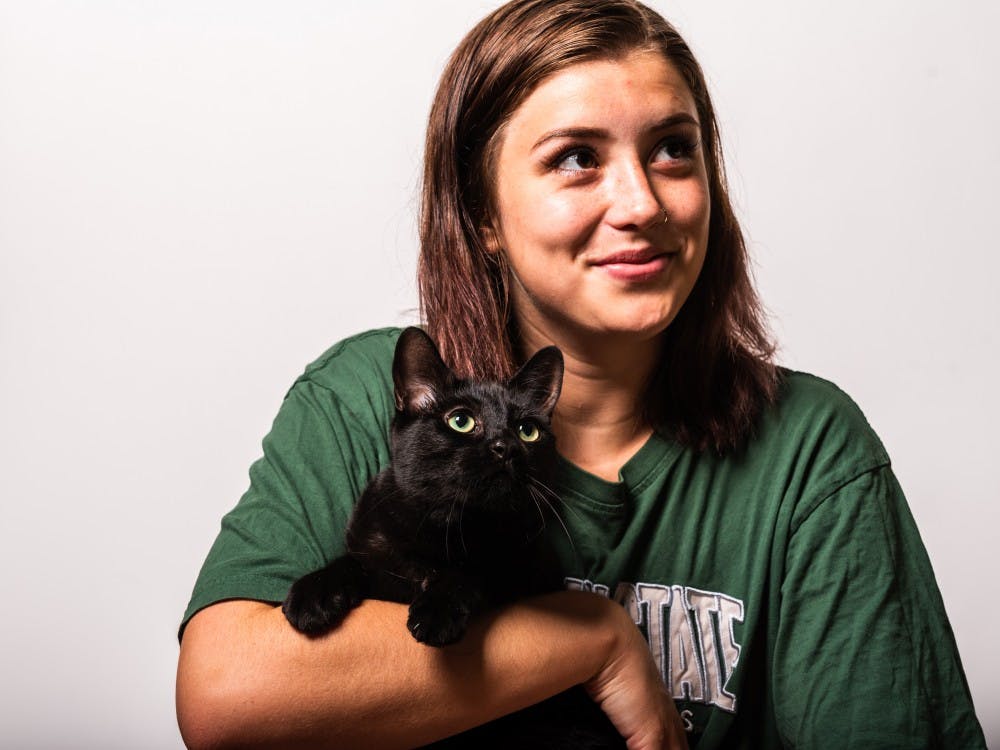Adapting to college life can be challenging. As you move into on-campus housing, you might wonder about the different resources on campus for mental health.
Project LETS at MSU and other on-campus mental health groups

MSU student Arlene Bradford holds her cat, Willow, while posing for a photo July 10, 2019. Playing with animals can be a great way to relieve the stress and anxiety that builds up throughout a semester.
Adapting to college life can be challenging. As you move into on-campus housing, you might wonder about the different resources on campus for mental health.
Project LETS at MSU and other on-campus mental health groups
Project LETS is a national organization with the goal of challenging the stigma associated with mental illness.
Anna Tomlanovich, a Project LETS at MSU member, said loneliness was something she struggled with as an incoming student.
“I’m from a very small town and I went to a very small school and I came (to MSU) by myself, so I didn’t have very many people around to have a community,” Tomlanovich said. “I didn’t have people to go do stuff with. I felt very isolated sometimes.”
During your first semester at MSU, it is encouraged to start building a community of friends as soon as possible. Having people to talk to — like your roommate — can help you manage lonely feelings you might be having upon arriving to college.
Forming bonds early on can be an important step to help make you feel more comfortable talking to someone in the future if you were to ever experience any mental health issues. Loneliness and homesickness don’t affect everyone in the same way.
A mental health advocacy program is also offered, where students can help those battling mental illness within their community. After an 8-week training program, they are paired with individuals who are experiencing the same area of mental health they studied.
Counseling and Psychiatric Services
MSU Counseling & Psychiatric Services, or CAPS, is an on-campus place to help students with mental health concerns. CAPS is located on the third floor of the Olin Health Center.
Students are allowed up to three free psychiatry sessions within their time at MSU. After that, the fourth session is billed by insurance or out of pocket.
“The best way for students to get connected is to simply just walk-in,” Mark Patishnock, director of CAPS, said. “That’s one of our goals: to make it as easy as possible.”
Every MSU student also has access to free and confidential services through an app called My SSP: My Student Support Program. The app provides counseling services that are available wherever you go through talk, text or video in over 100 languages. The app benefits those who don’t feel comfortable talking in person with a counselor.
CAPS offers same-day, drop-in screening with no appointment needed. During these drop-in sessions, they will ask questions to better understand your specific needs. CAPS will recommend services through CAPS or other services within the community for longer-term or specialized care.
Group counseling is another great alternative to meeting with a counselor one-on-one.
CAPS at MSU offers about 30 different support groups, covering a wide range of topics. Some of the group sessions are focused on body image, grief, gender identity, heartbreak, stress management, anxiety, bipolar support and more.
CAPS has a phone line for emergency situations. You can call 517-355-8270 and press “1” to get in contact with a counselor for free after hours.
“College is challenging. There are a lot of pressures that are put on (students) from many different directions,” Patishnock said. “I’d encourage students to know that there is no concern too large or too small to get this process started.”
Neighborhood Engagement Centers and the MSU Union have additional CAPS services.
Emotional support animals
Support student media! Please consider donating to The State News and help fund the future of journalism.
Patishnock said service animals, therapy animals and emotional support animals are all part of the mental health arena.
MSU provides accommodations to students living in the residential halls with a “documented disability.”
The university recognizes service animals as “any dog that is individually trained to do work or perform tasks for the benefit of an individual with a disability, including a physical, sensory, psychiatric, intellectual or other mental disability.”
The university recognizes assistance animals as “a category of animals that may work, provide assistance or perform physical tasks for an individual with a disability and/or provide necessary emotional support to an individual with a mental or psychiatric disability, but which are not considered Service Animals under the ADAAA.”
This story was updated Aug. 6 at 3:30 p.m. in order to clarify that the phone line for emergency situations is only available after CAPS's normal hours.